Gut dysbiosis-induced vitamin B6 metabolic disorder contributes to chronic stress-related abnormal behaviors in a cortisol-independent manner
- PMID: 39773070
- PMCID: PMC11730634
- DOI: 10.1080/19490976.2024.2447824
Gut dysbiosis-induced vitamin B6 metabolic disorder contributes to chronic stress-related abnormal behaviors in a cortisol-independent manner
Erratum in
-
Correction.Gut Microbes. 2025 Dec;17(1):2518803. doi: 10.1080/19490976.2025.2518803. Epub 2025 Jun 15. Gut Microbes. 2025. PMID: 40518556 Free PMC article. No abstract available.
Abstract
Chronic stress can result in various conditions, including psychological disorders, neurodegenerative diseases, and accelerated brain aging. Gut dysbiosis potentially contributes to stress-related brain disorders in individuals with chronic stress. However, the causal relationship and key factors between gut dysbiosis and brain disorders in chronic stress remain elusive, particularly under non-sterile conditions. Here, using a repeated restraint stress (RRS) rat model, we show that sequential transplantation of the cecal contents of different RRS stages to normal rats reproduced RRS-induced core phenotypes, including abnormal behaviors, increased peripheral blood corticosterone and inflammatory cytokines, and a unique gut microbial phenotype. This core phenotypic development was effectively inhibited with probiotic supplement. The RRS-induced unique gut microbial phenotypes at the genus level were positively or negatively associated with the levels of 20 plasma metabolites, including vitamin B6 metabolites 4-pyridoxic acid and 4-pyridoxate. Vitamin B6 supplement during RRS alleviated weight loss, abnormal behaviors, peripheral inflammation, and neuroinflammation, but did not affect the peripheral corticosterone levels in chronic stressed rats. Dampening inflammatory signaling via knocking out caspase 11 or caspase 1 inhibitor abolished RRS-induced abnormal behaviors and peripheral and neuroinflammation but did not decrease peripheral corticosterone in mice. These findings show that gut dysbiosis-induced vitamin B6 metabolism disorder is a new non-hypothalamic-pituitary-adrenal axis mechanism of chronic stress-related brain disorders. Both probiotics and vitamin B6 supplement have potential to be developed as therapeutic strategies for preventing and/or treating chronic stress-related illness.
Keywords: Chronic stress; gut microbial dysbiosis; restraint stress; vitamin B6.
Conflict of interest statement
No potential conflict of interest was reported by the author(s).
Figures
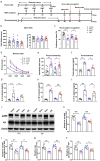
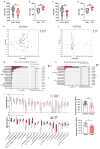


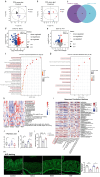
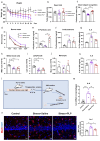
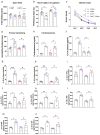
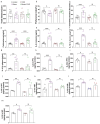
References
MeSH terms
Substances
LinkOut - more resources
Full Text Sources
Medical
